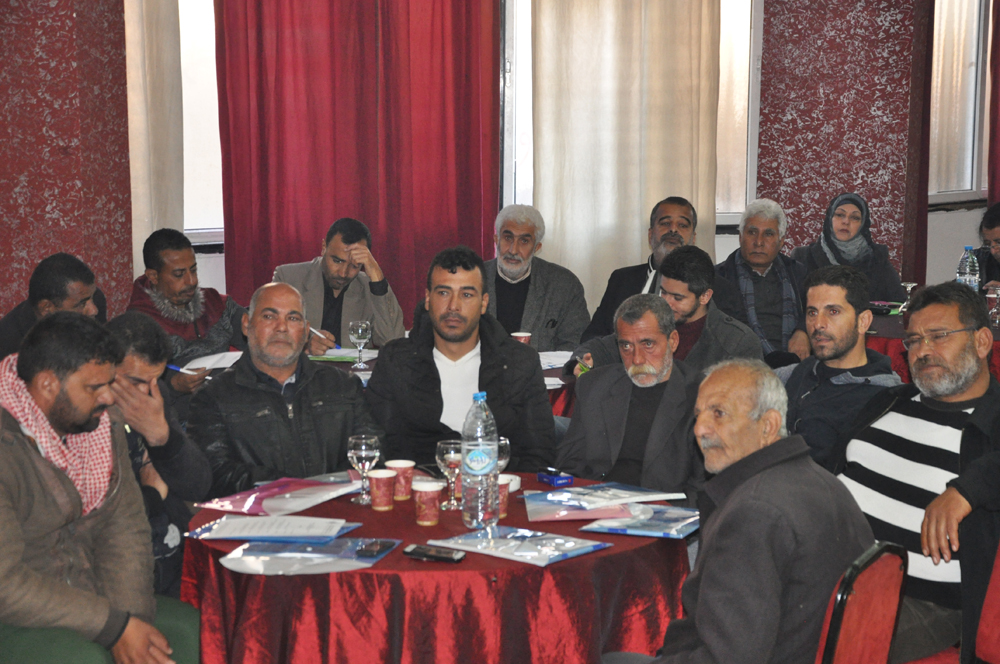On Tuesday, 16 January 2018, the Palestinian Center for Human Rights (PCHR) organized a workshop titled “Mechanisms to Protect Civilians and their Property in Land and Sea Border Areas.” The workshop was attended by specialists representing civil society organizations, international organizations, farmers and fishermen organizations in the Gaza Strip, and media organizations. The workshop was facilitated by Dr. Fadel al-Muzaini, a researcher at PCHR.

Hashim Al-Thalaini, Member of PCHR’s Board of Directors, opened the workshop and stressed that it aims at promoting the economic and social rights in the border areas in light of the Israeli attacks and restrictions on farmers and fishermen, preventing them from practicing their right to work and targeting their livelihoods. All of this has reflected on the Gaza Strip economic situation.
Azzam Sha’ath, a researcher at PCHR, presented the results of PCHR’s report on “Israeli Attacks in Buffer Zone Areas”, indicating the increase of Israeli attacks in these areas. He also gave statistics on the Israeli violations, pointing out that the Israeli forces carried out 433 attacks in the buffer zone areas, including 314 shooting incidents and 7 artillery shelling incidents. These attacks resulted in the killing of 7 civilians, wounding 185 civilians, damaging civilians’ property, arresting 50 civilians, and conducting 53 incursions.
In his presentation, Engineer Mohammed al-Baqari, General Director of the Union of Agricultural Work Committees (UAWC) highlighted impact of the Israeli attacks in the land border areas on the agriculture sector in addition to the restrictions imposed on farmers through imposing an Access Restricted Area (ARA) ranging between 300 meters to 1000 meters. This restriction bans farmers from accessing and planting about 30,000 dunums, which are among the most fertile agricultural areas in the Gaza Strip. Al-Baqari numbered the daily Israeli attacks that target farmers such as shooting, leveling lands, destroying water wells, and spraying herbicides, which caused damage to vacant areas of agricultural lands.
Zakariya Baker, Head of Fishermen Committees in the UAWC, pointed out in his presentation to the suffering of the Palestinian fishermen due to reducing the allowed fishing area to 6 nautical miles and the full control of the Israeli gunboats over the Gaza Strip waters and their continued attacks against the fishermen using live and metal bullets, shells, and water pumps in addition to artificial waves created by the Israeli gunboats to cause damage to the Palestinian fishing boats. Baker stressed that increasing the allowed fishing area in the central and southern Gaza Strip to 9 nautical miles is used by the Israeli forces to set an ambush for fishermen. Baker explained the catastrophic humanitarian reality of about 70,000 fishermen and their families in the Gaza Strip.
Hamada al-Bayari discussed the role of the Office for the Coordination of Humanitarian Affairs (OCHA) in protecting the border areas’ residents, stressing that the buffer zone imposed by the Israeli forces is considered one of the most dangerous areas in the Gaza Strip. He said that those areas are vulnerable to humanitarian disasters as their residents suffer from poverty and unemployment in desperate need for help. Al-Bayari emphasized that OCHA has designated about 550 million dollars as an urgent funding to implement humanitarian projects and programs to help the residents of the Palestinian occupied territory. However, the donors only provided half the money.
Lana Shahin, Editor-in-Chief of Al-Mayadeen Channel office in Gaza, said that all types of media cover the Israeli violations in both border areas in the context of conveying the daily suffering of the Gaza Strip population despite of the Israeli forces’ direct attacks against journalists. Shahin emphasized that the Israeli authorities deliberately conceal their crimes through denying international journalists’ access into the Gaza Strip.
At the end of the workshop, discussions were opened, and participants asked their questions. The workshop concluded with the following recommendations; most prominent are as follows:
- Calling upon the international community to intervene immediately and urgently to stop all the Israeli forces’ forms of serious violations against civilians living in the border areas.
- Calling upon the international community to intervene immediately and practice pressure on the Israeli forces to stop their violations against Palestinian fishermen and workers in the “Land and Sea” buffer zone areas in the Gaza Strip.
- Calling upon the international community to intervene to release all fishermen arrested and their equipment under custody and compensate them for the financial damage resulting from those attacks.
- Calling upon the international community to pressurize the Israeli authorities to end the buffer zone and ARA in the land area, increase the allowed fishing area, and open the border crossings so that the organizations relevant to the agriculture and fishing sector can import the equipment needed for maintenance of agricultural implements and fishing equipment and that farmers can export their agricultural products.
- Calling upon the international and humanitarian organizations to offer the necessary financial and technical assistance in the field of agriculture and fishing for fishermen and farmers.
01/06/18 Wadi Hilweh: Jerusalem in 2017 (VIDEO)




